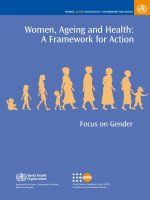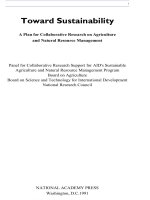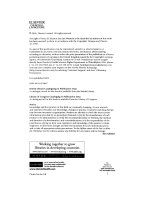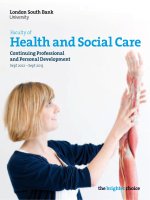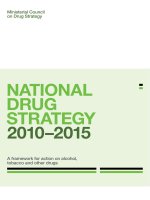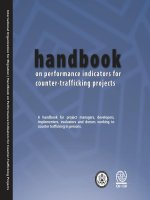a handbook for action research in health and social care
Bạn đang xem bản rút gọn của tài liệu. Xem và tải ngay bản đầy đủ của tài liệu tại đây (1.79 MB, 298 trang )
A Handbook for Action Research
in Health and Social Care
A Handbook for Action
Research in Health and
Social Care
Richard Winter and
Carol Munn-Giddings
with contributions by
Cathy Aymer, Peter Beresford, Jane Bradburn,
Valerie Childs, Brenda Dennett, Philip Ingram,
Philip Kemp, Noreen Kennedy, Richard Lawrence,
Cherry Mackie,Vicky Nicholls, Fergal Searson,
Michael Turner and Yan Weaver
London and New York
First published 2001
by Routledge
11 New Fetter Lane, London EC4P 4EE
Simultaneously published in the USA and Canada
by Routledge
29 West 35th Street, New York, NY 10001
Routledge is an imprint of the Taylor & Francis Group
This edition published in the Taylor & Francis e-Library, 2002.
© 2001 Selection and editorial matter, Richard Winter and
Carol Munn-Giddings; individual chapters, the contributors.
All rights reserved. No part of this book may be reprinted or
reproduced or utilised in any form or by any electronic,
mechanical, or other means, now known or hereafter invented,
including photocopying and recording, or in any information
storage or retrieval system, without permission in writing from
the publishers.
British Library Cataloguing in Publication Data
A catalogue record for this book is available
from the British Library
Library of Congress Cataloging in Publication Data
Winter, Richard, 1943–
A handbook for action research in health and social care /
Richard Winter and Carol Munn-Giddings.
p. cm.
Includes bibliographical references and index.
1. Human services—Research. 2. Action research.
3. Action research—Case studies. I. Munn-Giddings, Carol,
1961–
II. Title.
HV11 .W597 2001
362′.07′2—dc21
ISBN 0–415–22484–5 (pbk)
0–415–22483–7 (hbk)
ISBN 0-203-19967-7 Master e-book ISBN
ISBN 0-203-19970-7 (Glassbook Format)
00–047058
To Ella and Anenti
Contents
List of contributors
Acknowledgements
Preface
xi
xiii
xv
PART I
The nature of action research
1
1 Introduction
Prologue 3
Outline structure of the book 4
What is ‘action research’? 5
A definition 8
3
2 Action research as an approach to inquiry and development
The cycle of action and reflection as a model of ‘work’ 9
Action research and other models of social research 14
Creating a ‘culture of inquiry’ in practice settings 23
9
3 Action research: contexts and dimensions
Introduction 27
1 Service-user research 28
2 Action research and community development 33
3 Action research as management: consultancy or
organisational learning? 37
4 ‘Facilitation’: issues of power and learning 42
5 Action research as ‘responsive’ evaluation 45
6 Action research and ‘critical reflection’ 50
7 Action research and feminist research 55
8 Action research and anti-racist research 58
Conclusion 62
27
viii Contents
PART II
Examples: the variety of action research
4 Developing nursing practice: introducing knee-length
anti-embolic stockings
63
65
NOREEN KENNEDY
5 Introducing bedside handovers: changing practice on a
coronary care unit
74
FERGAL SEARSON
6 Empowering the supporters: enhancing the role of
unqualified support workers in a housing scheme for
people with mental health problems
88
PHILIP KEMP
7 What does an elephant look like? Problems encountered
on a journey to innovation in child protection
102
VALERIE CHILDS
8 Developing client-focused work with people with profound
learning disabilities
116
BRENDA DENNETT
9 Researching the experiences of black professionals in
white organisations: an example from social work
131
CATHY AYMER
10 Community involvement in a bid for urban regeneration
funds
145
RICHARD LAWRENCE
11 The Citizens’ Commission: a UK case study of
service-user-controlled research
160
PETER BERESFORD AND MICHAEL TURNER
12 The Camden ‘Alternative Choices in Mental Health’ project
175
YAN WEAVER AND VICKY NICHOLLS
13 A foot in the door: a collaborative action research project
with cancer service-users
187
JANE BRADBURN AND CHERRY MACKIE
14 Pauline and Alzheimer’s: ‘reflections’ on caring
PHILIP INGRAM
199
Contents ix
PART III
Undertaking an action research project:
a practical guide
1
2
3
4
5
6
7
8
205
Introduction 207
Choosing a topic 207
Introduction to action research 208
Critical reflection 210
Preparing an action research proposal 215
Ethical issues and principles of procedure 220
Gathering ‘data’ 224
Analysing and reflecting on data 234
Writing an action research report 241
Appendix: Practical Guide supporting documents 245
PART IV
Action research as a form of social inquiry:
a ‘theoretical’ justification
253
Introduction 255
Action research and relativism 256
Critical realism 259
Action research and critical realism 263
Conclusion 265
Bibliography
Index
266
275
Contributors
Cathy Aymer is a Senior Lecturer in the Department of Social Work and Director
of the Centre for Black Professional Practice at Brunel University. Her main
areas of work are anti-discriminatory practice and race and gender diversity in
organisations. Her other interests are the ways in which welfare services respond
to the needs of African refugees and of young black men.
Peter Beresford was convener of the Citizens’ Commission on the Future of the
Welfare State. He is Professor of Social Policy at Brunel University and works
with the ‘Open Services Project’ and the Brunel University Centre for Citizen
Participation. He is a long-term user of mental health services and is actively
involved in the psychiatric system survivors’ movement.
Jane Bradburn is a Research Associate at the College of Health, London. She
carried out this research with cancer self-help groups at the Mount Vernon
Hospital as part of a doctorate funded by the UK Economic and Social Research
Council. She has since developed the ‘Cancer Voices’ project with the national
charity Cancerlink.
Valerie Childs wrote this report when she was a social worker with Essex Social
Services Department, where she is now a senior social work practitioner. She
has worked with children and their families since 1976, in residential and
fieldwork settings. She currently contributes to Diploma in Social Work training
at Anglia Polytechnic University and offers consultation to colleagues
undertaking complex casework and group work.
Brenda Dennett qualified as a social worker in 1983 and obtained a post-qualifying
Honours Degree in Social Work in 1995. She undertook the piece of work
reported here when she was working for Essex Social Services Department as
the manager of a day-care centre for people with profound learning disabilities
and complex needs often leading to behaviour which challenges service
provision. She is now working as respite care manager for South Essex.
Philip Ingram is an engineer by training but retired prematurely to care for his
wife during her early-onset dementia. He is now a freelance trainer and writes
on dementia and on service-users’ and carers’ issues. He has been active in
promoting user involvement in service design and monitoring, has set up a
xii Contributors
number of carers’ groups and helped to establish a branch of the Alzheimer’s
Society in Ipswich, Suffolk.
Philip Kemp has many years of experience in the mental health field and has a
particular interest in supported housing. The work reported here was undertaken
when he was working for the London borough of Barking and Dagenham Social
Services Department. He is now a Senior Lecturer in the Faculty of Health at
South Bank University, London.
Noreen Kennedy undertook the work reported while she was working as a ward
sister at the Middlesex Hospital in central London, where she is now Senior
Nurse in Practice Development for General Surgery, Trauma and Orthopaedics.
She has also facilitated action research projects in other clinical areas and takes
a lead role in developing evidence-based practice.
Richard Lawrence undertook the work reported when he was working as a
community development officer with Carlisle City Council. He is now a
community development project officer with Warwickshire County Council,
supporting a multi-agency partnership team in the development of a community
strategy for Stratford-upon-Avon district.
Cherry Mackie is a long-term survivor of breast cancer and works as co-ordinator
of the cancer service-user support groups at the Lynda Jackson Macmillan
Centre, Mount Vernon Hospital, London.
Vicky Nicholls is a research support worker at the Mental Health Foundation,
London. She previously worked at the Greater London Association of
Community Health Councils and has completed an MA in Health and Social
Policy, including research into community involvement in health needs
assessments.
Fergal Searson is a Senior Lecturer in the Department of Acute and Critical Care
Nursing, University of Central Lancashire, Preston, with a specific focus on
coronary care nursing. He has a particular interest in involving patients in their
experience of illness.
Michael Turner was the lead worker with the Citizens’ Commission on the Future
of the Welfare State and also with the ‘Shaping Our Lives’ and ‘Our Voice in
Our Future’ projects, based in the National Institute of Social Work, London.
Yan Weaver initiated and co-ordinated the service-user-led ‘Making Choices’
project in Camden, London, and the ‘Alternative Choices in Mental Health’
research project (with support from the Mental Health Foundation) and produced
a mental health handbook/directory for the borough of Camden. He has
experience of receiving mental health services of various kinds, including inpatient psychiatric treatment. He also has several years’ training and experience
in psychotherapy and counselling, and has worked as a mental health residential
and community support worker. He currently co-ordinates the work of a
telephone information and advice service for ‘Lambeth Mind’, a user-led mental
health charity in South London.
Acknowledgements
Richard Winter’s work on the book was funded by the award of a Research
Fellowship by the Leverhulme Trust.
Carol Munn-Giddings’ contribution was partly funded by a grant from the HEFC
RAE funding to the Social Work and Social Policy Division of the University.
Many thanks for the careful work of our panel of ‘critical readers’ – nurses, social
workers, professional educators and service-users: Jane Arnett, Mary Barrett, Leo
Bishop, Paul Chidgey, Jill Clark, Jayne Crow, Susan Hart, Lindsay Hill, Brenda
Landgrebe, Rollanda Law, Liz Morris, Fungai Nhiwatiwa, Vivien Nice, Tony
Porter, Jane Scoggins and Jan Thurlow. Chapters 1, 2 and 3 were substantially
revised in the light of their suggestions.
Particular thanks, also, for helpful advice on the sections concerning serviceuser research and anti-racist research in Chapter 3, to: Jill Aylott, School of Health
and Community Studies, Sheffield Hallam University; Cathy Aymer, Brunel
University Department of Social Work; Peter Beresford, Professor of Social Work
at Brunel University; Sharon Dennis, Nurse Adviser at Lewisham University
Hospital.
Chapters 5 and 6 are reprinted by permission of the editors of the journal
Educational Action Research.
Chapter 14 is published with the agreement of the Royal College of Psychiatrists:
an earlier abridged version was published in R. Ramsay (ed.) Light at the End of
the Tunnel (London: Gaskell, 2000).
Preface
The title Handbook is intended to indicate the varied nature of the contents and the
different ways in which the book may be used or approached. In Part I there is a
sequence of chapters giving a general theory of action research, first as a simple
outline, then in more detail – comparing action research with other forms of social
research – and finally emphasising its range and variety. Some may wish to start
with this material, but others may prefer to begin by looking at the series of practical
examples from different contexts presented in Part II and then go on afterwards to
compare them with the theoretical discussions. The most abstract presentation of
a ‘theory’ for action research is postponed to the end of the volume, to signal that
although it may be of key importance for some readers, others may not find it
necessary, and that in any case it is not essential for an understanding of the rest
of the book. There is also a ‘Practical guide’ (Part III) which is intended specifically
for groups wishing to use the Handbook to support them in undertaking their own
practical developmental work, either independently or as part of a tutor-led course.
For such readers, Part III may be their starting point for approaching the other
material.
The book is a joint enterprise arising from a longstanding commitment on the
part of both authors to the democratisation of social research. The themes and
structure of the book were the outcome of lengthy discussions in which we
combined our different but complementary approaches. Thus, Carol MunnGiddings contributes experience and knowledge of service-user movements,
service-user research, the community development tradition, and feminist research;
and Richard Winter has particular expertise concerning practitioner action research,
theories of management, and research methodologies based on collaborative
developmental reflection.
Most of Parts I and IV of the book were initially drafted by Richard Winter, and
revised in response to commentary and additions by Carol Munn-Giddings. Chapter
3 was written jointly, and represents a synthesis of our differing perspectives on
action research. The same is true of the series of practice examples in Part II, for
which we were jointly involved in identifying the contributors. Part III consists of
material devised over many years for Richard Winter’s courses on action research
at Anglia Polytechnic University for social workers, nurses, managers, lecturers
and school teachers. The final editorial work was undertaken by Richard Winter.
xvi Preface
Carol Munn-Giddings worked for many years as a social researcher in various
health and social services settings, including the voluntary sector, undertaking,
facilitating and managing projects relating to service-users’ perspectives. In her
current post at Anglia Polytechnic University she is Reader in Participative Inquiry
and Director of Research in the School of Community Health and Social Studies.
Her work includes teaching research and innovation to practitioners and supporting
staff in developing their own research.
Richard Winter has been involved with action research for most of his
professional career. He is Professor of Education at Anglia Polytechnic University,
where he leads an action research course providing support for practitioners and
managers in a variety of professions, including health, social services and education.
He is also Co-ordinator of the international action research group Collaborative
Action Research Network, and co-editor of the journal Educational Action
Research.
Email addresses
Part I
The nature of action
research
Chapter 1
Introduction
Prologue
This book is about the use of action research as a strategy for inquiry and
development. It proposes a form of social research which is not a separate,
specialised, technical activity but one which is closely linked to practice and which
can be undertaken by practitioners and service-users. It presents a general theoretical
explanation, a series of specific examples illustrating a variety of approaches and
contexts, and detailed practical guidance for those wishing to undertake an action
research project.
The book is particularly addressed to managers, service-users, staff workers
and educators involved in social and health care and community development but
those concerned with teaching and with management more generally will also find
almost all the arguments and examples applicable to their own contexts. We have
in mind several rather different forms of inquiry, and the following list gives an
idea of the range of contexts and people we hope to address:
•
•
•
•
•
efforts on the part of staff in caring organisations (hospitals, social services
departments, voluntary agencies, residential facilities, day centres, etc.) to
develop their care work with patients/clients/ service-users;
efforts on the part of service-user groups to develop their own services and/or
improve the quality of services provided, either by gathering the views of
service-users or by working in partnership with staff;
efforts on the part of professional educators/trainers/tutors to facilitate the
development of community, health and social care practices and to foster
‘professional’ learning;
efforts on the part of managers to improve the quality of services through
developing managerial processes and relationships;
efforts on the part of community-based staff in mobilising efforts to develop
and promote community action and support facilities such as advice and
drop-in centres.
This variety means that it is sometimes difficult to find words which will seem
exactly appropriate for all our anticipated readers. In particular, such words as
4 The nature of action research
‘work’ and ‘practice’ are intended to refer to all the activities listed above, whether
undertaken by managers, educators, service-users or social and health care staff
and community workers (with or without professional qualifications). Similarly,
the term ‘practice context’ is intended to refer to service-user group meetings,
hospitals, care agencies and educational/training processes. If sometimes
our phrasing seems to be excluding some of these activities, we apologise: our
arguments about action research and our examples of practical work are fully
intended to be relevant for the whole variety of readers and contexts indicated above.
Outline structure of the book
As indicated in the Preface, the book may be used in different ways by readers
with different purposes. As a handbook, it is not necessarily intended to be read
straight through.
The next section of this chapter introduces the concept of action research through
discussion of a specific example, and ends with a preliminary ‘definition’.
Chapter 2 explores further how action research is different from other forms of
research, arguing that it is an extension of ‘reflective practice’ in professional work
and showing how it is different from (but related to) conventional quantitative
research and conventional qualitative research. It shows how action research
transforms key aspects of the inquiry process and ends with an account of ‘cultures
of inquiry’ in the workplace.
Chapter 3 presents the range and variety of action research, discussing key themes
of power, validity, collaboration, and reflection on personal experience, drawn
from:
service-user research
community development
theories of management and organisational change
theories of critical reflection and evaluation
educational action research
feminist research
anti-racist research
Part II (Chapters 4–14) illustrates further the variety of action research,
comprising a series of contrasting reports of practical projects from differing
contexts: nursing, social work, community development, professional education
and service-user research. Each report is complete and self-explanatory, and
provides for those interested in undertaking an action research project a possible
way of focusing, planning and carrying out a useful piece of work. Together, these
chapters demonstrate in practical detail action research’s range of purposes, research
relationships, results, methods, and styles of reporting.
Part II provides comprehensive step-by-step guidance on planning and
undertaking an action research project. It contains detailed discussion documents,
developed for action research courses over many years, to support each stage of
Introduction 5
work: clarifying the nature of the project, practical planning, consideration of ethical
issues, data gathering, data analysis and writing a research report. It is particularly
intended for readers who are about to undertake a research project, and includes
advice on how to use the other sections of the book to inform their work at different
stages.
Finally, Part IV provides a brief ‘theoretical’ justification for action research to
reassure those who are concerned that it may lack the rigour and objectivity of
‘proper research’. This part of the book may be of particular interest to senior
managers and those responsible for allocating research funding, in contexts where
action research often finds difficulty in gaining recognition and support. The
argument of Part IV complements earlier arguments derived from the action
research literature (in Part I) to provide a more general grounding for action
research’s intellectual and professional rationale.
What is ‘action research’?
In discussions of methods for social research, professional development and
organisational change, the term ‘action research’ is both appealing and yet somewhat mysterious. Its ambiguity is easy to see: ‘action research’ suggests a single
activity which is simultaneously a form of inquiry and a form of practical action.
Clearly, any ‘research’ process involves some form of ‘action’ (interviewing,
distributing questionnaires, etc.), but ‘action research’ refers to something rather
different. It suggests the possibility of a form of social research which involves
people in a process of change, which is based in professional, organisational or
community action, and which is thus no longer beset by the age-old problem of
the gap between ‘theory’ and ‘practice’. (We all know jokes about, for example,
professors of physics who can’t change a fuse and psychologists who can’t manage
their own personal relationships.) At the same time, it proclaims an ideal of practical
work which is also a form of learning for those involved (action as research). Hence
its appeal.
Putting these ideas together, then, ‘action research’ refers to a process which
alternates continuously between inquiry and action, between practice and
‘innovative thinking’ (Hart, 2000) – a developmental spiral of practical decisionmaking and evaluative reflection. It is both reflective practice and practice-based
research. A nice idea, perhaps (you say), but what does it really involve? Is it
feasible, and if so what does it achieve? Is it really ‘research’? If so, in what sense?
In what sense are its outcomes ‘valid’ and/or generalisable? Is it a worthwhile use
of precious time? It sounds like hard work: is it worth it? Who benefits? Does it
have a sound basis, or is it just a wishy-washy ideal? These are some of the questions
we hope to answer in this book.
An introductory example/practical exercise
In order to get some feel for the processes of an action research project and how
they differ from other sorts of research, imagine the following scenario. Your
6 The nature of action research
organisation has had a windfall: suddenly the sum of £4,000 is available; this will
pay for, say, seventy hours of someone’s time to investigate an aspect of the work
that you are engaged in; and it is up to you to say what the focus of the inquiry
should be.
(Before you read any further, make a note of such a topic – something that
strongly affects your current work and which you really wish you understood
better than you currently do.)
Having decided on your topic, now imagine that you have received the money on
condition that the inquiry is carried out by a professional research worker from the
organisation’s research department or from a university or other external body.
What would you ask the researcher to do, and what sort of outcomes would you
expect by the end of the inquiry process? And now, in contrast, imagine a slightly
different scenario: it is stipulated that you must carry out the inquiry yourself,
with the £4,000 being used to ‘cover’ the work you usually do. (Again the time
available is seventy hours, to be structured as you wish – perhaps two weeks full
time or three hours a week for about four months.) What activities would you engage
in, and what outcomes would you expect? Finally, consider the probable differences
between these two contrasting situations: what differences might there be in the
way you and the outside researcher set about conducting the inquiry, what different
conclusions might emerge, and how might the two inquiry processes have a different
impact on the work situation?
Let us now consider a concrete example, which reveals, in a preliminary way,
some important clues to the nature of action research. Barbara Stansell, a social
worker, was, in 1997, responsible for a small team of staff working in a centre for
people with learning difficulties. She was worried by what seemed to be an
unacceptably high rate of staff absence due to sickness (Stansell, 1997). If resources
had been available she could have commissioned an outside researcher to interview
the staff and collect their explanations for their absences, together with their
proposals for any changes which might improve matters. She might also have
asked the researcher to collect comparative data on rates of absence in other, similar
teams, in the hope that some useful patterns might emerge, indicating the factors
influencing staff absence rates – the size of the team, the profile of its members in
terms of age, gender and family situation, the type of client, type of neighbourhood
served, level of service-user involvement, etc. At the end of the work, Barbara
would have received a report containing a collection of different possible ‘reasons’
for staff absence (some offered by the staff, some in the form of suggested
contextual influences) and some positive proposals. This would have been, let us
say, a piece of ‘conventional’ social research.
But, in this case, Barbara undertook the inquiry herself, as an ‘action research’
project. And as soon as she began to consider how to approach her staff interviews,
she realised that to focus directly on staff absence and sickness might seem so
threatening as to be merely counterproductive for all concerned. Instead she needed
to focus, positively, on how to improve staff morale, and that decision eventually
Introduction 7
resulted in her project being very largely concerned with her own management
style, and especially with the contradictions in her attempts to be ‘democratic’. (She
thought of herself as leaving her staff plenty of scope for their own decisions, but
found that in many ways she was much more ‘directive’ than she had thought.) So
part of her work involved, for example, discussions with her staff as to how the
arrangements for group meetings might be used to increase a sense of participation
and achievement. What had started out as a proposal on the part of a manager to
‘interview’ individuals thus became a much more long-term project which was
collaborative, focused on the staff group as a whole, and self-evaluative.
Commentary
This example is drawn from an organisational context: it happened to be a daycentre staff team, but it could easily have been a hospital ward or a service-user
group. And one can also see how a similar set of alternatives might arise in the
context of community work or service-user research, if one was worried about, let
us say, the apparent under-utilisation of an Advice and Support Centre. So what
general conclusions can we draw?
To begin with, we may note that action research is an approach to social research
– understanding how human beings interact with one another, and how we respond
to events and situations. Next, it is clear that action research is concerned just as
much with the process of inquiry as with its ‘findings’: any research process creates
relationships, and action research is concerned that its long-term impact on relationships should be positive as well as illuminating. Even more importantly, action
research emphasises the value of insights derived from practical involvement in a
situation, rather than the contribution of supposedly ‘objective’ methods applied
by outsiders. An outsider acting on Barbara’s original formulation of the problem
could have done considerable damage to what were already fragile relationships:
it was Barbara’s concern for her team that led her to realise that the project needed
to be refocused. And it is doubtful whether the comparative data would have offered
Barbara as much guidance on the nature of her ‘problem’, and what to do about it,
as the collaborative process she set up with her staff.
Action research seeks to bridge the ever-present gap between ‘theory’ and
practice. It does so in two ways. It places value on the experiential basis for
knowledge and it emphasises the practical motive for developing one’s
understanding:
Action researchers . . . are inclined to see the development of theory or understanding as a by-product of the improvement of real situations, rather than
[seeing] application as a by-product of advances in ‘pure’ theory.
(Carr and Kemmis, 1986: 28)
Action research might be defined as: the study of a social situation with a
view to improving the quality of action within it.
(Elliott, 1991: 69)
8 The nature of action research
In other words, action research is based on the assumption that increased
understanding will flow from our commitment to try to bring about practical
changes.
Finally, it is important to notice the ‘political’ ideal underlying action research.
Action research starts from the belief that knowledge about human situations can
be generated from our commitment to practical situations, and that our practical
involvement can in itself create the understanding which our circumstances require.
So we do not need to be dependent on outside experts on social science theory and
methodology in order to be able to formulate issues or to determine appropriate
methods. Action research is therefore about establishing inquiry processes which
are specifically designed to be ‘empowering’ for the subjects of the inquiry. There
is a danger of this becoming mere rhetoric: for many of us, encounters with the
reality of power are both depressing and distressing, and ‘action research’ doesn’t
magically change this. But the concept of empowerment is of central importance.
It embodies action research’s fundamental optimism concerning people’s ability
and willingness to work together constructively, and also an ideal of democratic
participation and responsible citizenship. Action research envisages a process
whereby our understanding of ourselves and of the social world in which we are
engaged can be developed and deepened as a direct consequence of our practical
commitments. For action research, hierarchies of power and status (between
academic and practical knowledge, between researchers and practitioners, between
professionals and their clients, between experts and laypersons) are seen as
inhibiting and impoverishing the creation and distribution of knowledge.
A definition?
Some of the statements already presented could be taken as ‘definitions’ of action
research. And by the time you have read further you will probably want to construct
your own definition. But at this stage, as a start, we might suggest the following.
Action research is the study of a social situation carried out by those involved
in that situation in order to improve both their practice and the quality of their
understanding.
